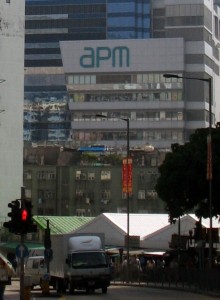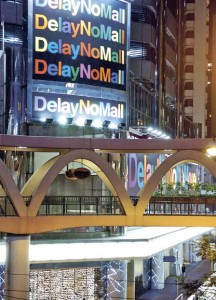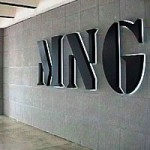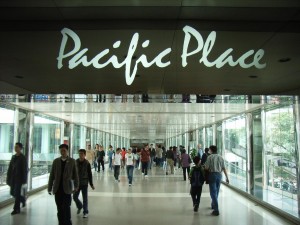It shouldn’t be any different in other metropolises, but in Hong Kong, one of the major activities people have during the Christmas holiday is shopping in big, grand and sometimes grandiose shopping malls. Certainly these malls have been getting more or more thoughtfully designed and decorated, but at the same time, another trend seems to have emerged in recent years.
There is a shopping mall called East Point City near where I live. About a year ago, it was renovated and all the promotion campaigns of the mall started to refer to it simply as EPC. At first I was pretty clueless about why the developer decided to make such a change, then I realized a lot of malls had already done the same thing.
Possibly because of the success of this mall, other malls and even shops and restaurants which had previously had English names started to rebrand themselves under new, abbreviated names. The International Finance Center is much more commonly known simply as IFC. The mall in World Trade Centre is named WTC more, which shouldn’t have surprised many. Delay No Mall, a mall whose name was criticized by many because of its probably purposefully close pronunciation to a Cantonese swearing phrase, has been renamed to DNM. Maxim’s, a large local fast-food restaurant chain, is now marketed as MX, alongside with its Chinese name.
Nevertheless, the trend certainly did not start in Hong Kong. I remember when I was small, I used to see the name Kentucky Fried Chicken written on the wall in any KFC, but now it’s just KFC. Other well-known examples are IBM and AT&T, whose full names are either rarely or no longer in use.
There could be many reasons for why a company decides to adopt an initialism as its official name. For KFC and AT&T, it is because their businesses have changed or expanded, such that the original names no longer reflect their true natures, and yet they wish to retain the goodwill they have established. For IBM, it has been said that the use of an abbreviation enables the company to enter the global market without translating its name into local languages. For DNM, it is to avoid a controversial name.
These reasons, however, do not seem to justify why many malls and shops in Hong Kong start to use initialisms. Initialisms, as a matter of fact, were not in widespread use until relatively recently. The true reason is probably that initialism has somehow been associated with trendiness in recent years.
As the purchasing power of the younger generation has been ever growing, many fashion labels, such as Dolce & Gabbana, Mango and Christian Dior, started separate production lines to target on this age group. These lines often have shortened or abbreviated brand names, such as D&G from Dolce & Gabbana, MNG from Mango, and Dior from Christian Dior. As abbreviated names are traditionally felt to be more informal, they can more easily diffuse into the youth culture because they also sound lighter, livelier and more playful.
For the same reason, malls and shops begin to adopt abbreviated names to suggest their youthfulness, trendieness or freshness. Indeed, few malls where all the luxurious labels gather, such as Pacific Place and the Landmark, have abbreviations of any kind, partly because they tend to use short, elegant names right from the start, and possibly partly because they want to maintain a more serious, more prestigious and less casual image. However, whether this will change as the trend goes on is something we have to wait and see.





